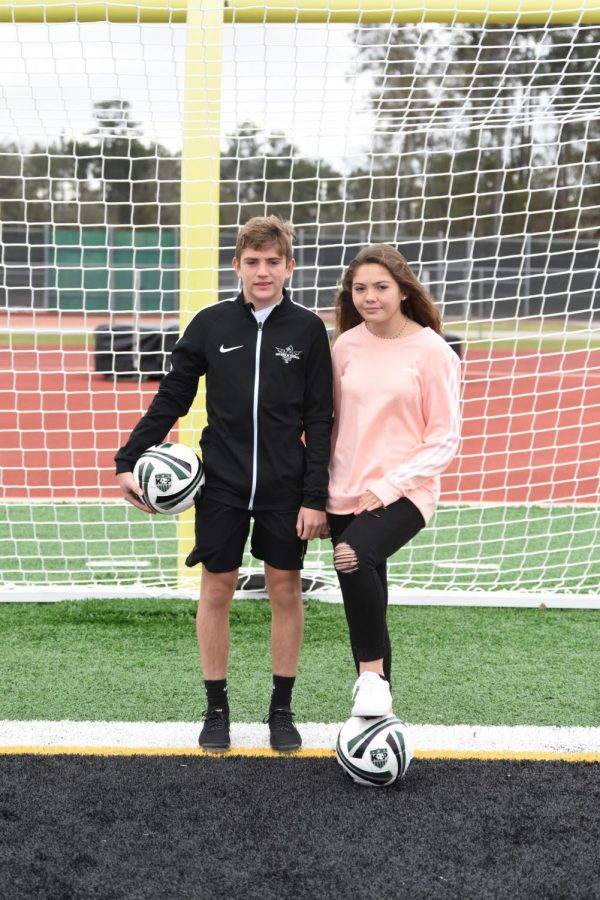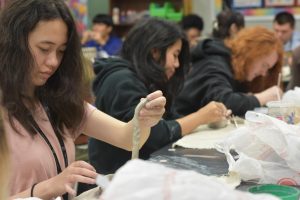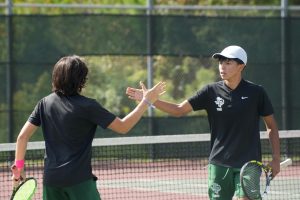Soccer a constant in Rickers’ lives after move from Qatar
Sophomore Trey Ricker and his sister, freshman Bailey Ricker, have used their love for soccer to help them adjust to life in the U.S. after six years in Qatar.
February 13, 2020
Sophomore Trey Ricker and his sister, freshman Bailey Ricker, have a secret weapon when it comes to their mutual favorite sport: Qatar.
The duo lived in the Middle Eastern country of Qatar for six years, until their dad was relocated back to the states for his work last summer. The move back to the United States was rough on the Rickers, along with their brothers Tyler, 19, and Jack, 11. One thing that they could always find solace in, however, was soccer.
“Having my team, they were immediate friends, and soccer is always something I can turn to when I’m bored or stressed,” Bailey said. “We both have our soccer teams. Those are automatic friends for us to have, and we both have the same personality so we have a lot of mutual friends.”
The Rickers’ father played soccer while living in Argentina for two years, and their mother played in high school, so soccer has always been ingrained in the Rickers. Their oldest brother, Tyler, plays for Southern Virginia University. Though they had hopes to play on varsity, the two have to play on the junior varsity team due to their transfer.
“I’ve played my whole life, as long as I can remember,” said Trey, who plays midfield and left wing. “I like having the ball at my feet and being able to run.”
Although soccer appeared to be a common factor, changes were still evident even in something familiar. After playing in Qatar for six years, the Rickers now play for the Houston Dash and Dynamo.
“The values of the sport are different,” Trey said. “Over there it’s all about technical ability and how good you are with basics and stuff. Here it’s hard work and conditioning, it’s more building you into an athlete than a soccer player.”
The Rickers’ parents had a hard time breaking the news to their kids, they had friends they would miss. They had to focus on the positives instead of everything they would lose.
“[We] emphasized all the positives,” Robert Ricker, their father, said, “[and] listened when they had concerns. We also chose to live in an area where they had spent time during the summers while we lived overseas. We intentionally chose Kingwood Park as the place we felt was the best fit for them based on their transition from a smaller, international school to large US high schools.”
Besides soccer, the Rickers had to make big adjustments to the American way of life, especially the schooling system.
“The school over there is super diverse. We have a bigger picture than a lot of people (have) about different types of people,” Trey said. “I’ve known people from all over the world. Over there, it’s an American school system but heavily European impacted, so it’s different: different grading systems and the style of schooling is different.”
Bailey agreed with Trey’s view on how much more diverse Qatar is than Kingwood.
“It’s made me a lot more open-minded to a lot of things. Over there it’s very diverse at our school, over 70 nationalities, and we’ve also been to over 39 countries,” Bailey said. “I think it really opened my eyes.”
While the siblings agree on some issues, they have differing viewpoints on the better place to live. Trey would love to go back to Qatar to his friends and his home of six years, but Bailey has a more long-term viewpoint.
“Probably in the long run, here is way better,” Bailey said. “America has way less problems, the temperature is better, and there’s so much more stuff and food and you can access more things. The only reason I would move back if I had the option is because all my friends are there, that’s where I grew up, so I have a lot of memories.”
Trey and Bailey both have the same goal for their future, a spot on the men’s and women’s US National soccer teams. Trey said that his ultimate goal is to play professionally, but if that turns out to not be a viable choice, he wants to be a physical therapist. Their parents fell in love with the sport, and their kids have fallen for it, too.
“[Their mom] played both club and high school soccer growing up,” Robert said. “I fell in love with the game while serving a church mission in Argentina. We love that it is a lifetime sport and also the teamwork aspect of the sport. It is a common language across the world. Everywhere we travelled the kids took a ball and met people.”








